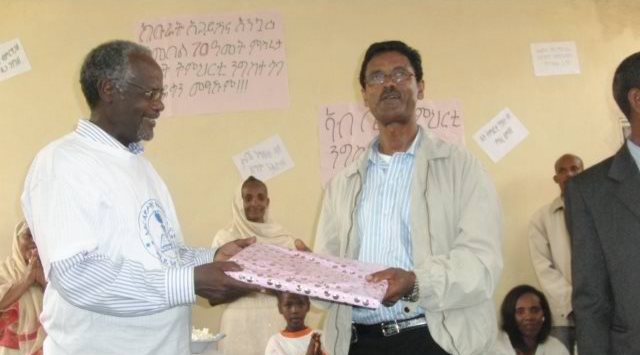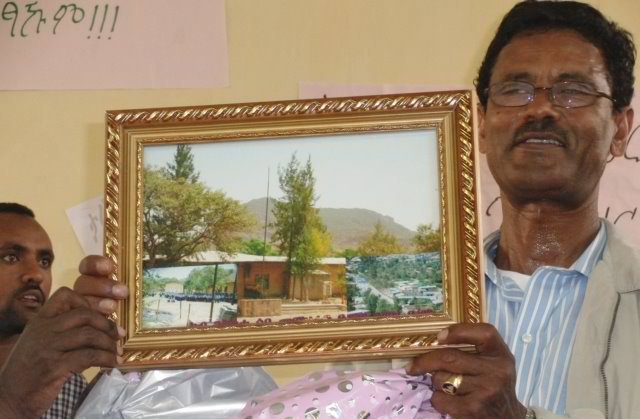Comcast Network Tech Leads Nationwide Group Helping Rebuild School in Ethiopia

Above, you can hear from Comcast network technician Berhane Belai why he and other graduates of Queen Sheba School in Adwa are working to help students in Ethiopia today.

Comcast Network Technician Berhane Belai receives an award in Ethiopia this past summer from college educator Dr. Ykebe Abreha for his work in leading alumni of Queen Sheba School in fundraising. Alumnae both throughout the world and in Ethiopia plan to rebuild the school which was damaged during civil war.
If you’re in West Seattle, you might drive past Berhane Belai and his Xfinity-labeled bucket truck and not give them a second thought. Network technicians like him are out all the time, working with lines and equipment throughout the state . They keep your digital signals flowing and strong. Belai’s been working in the telecoom industry for 24 years.
You wouldn’t know he was born in Ethiopia, went to college in Moscow and got a graduate degree in chemical engineering, and lived in West Germany and Washington D. C. before coming here.
And you sure wouldn’t know he is chairman of a nationwide group of immigrants from Ethiopia who have helped raise millions to rebuild Ethiopia’s largest school complex.
“Berhane is a smart and hard-working man, and he sure has an interesting history,” says his boss, John Vavrousek, network maintenance manager in Seattle.
Belai was born in Ethiopia, the second-largest country by population in Africa. There is no public school system there. Whether you got educated depended a lot on your parents. Belai’s father was a teacher, which may help explain his son’s dedication to education today. Belai attended Queen Sheba School, which is a K-12 school in Adwa. There are a few other schools in Adwa, but Queen Sheba in the mind of its graduates is THE school. It has turned out many of the country’s professionals and government officials.
One of Belai’s good childhood friends in those years was Meles Zenawi. As these young men entered adulthood, Ethiopia’s history turned brutal. Ethiopia was torn by civil war. The boys didn’t know it at the time, thank Heavens, but Zenawi was going to spend 17 years as a guerilla fighter before the government changed. Zenawi became prime minister in 1995 and was among the most influential men in Africa before his death in August from intestinal cancer.
Belai, like many other graduates of the school, left the country during the civil war. He studied chemical engineering in Moscow and took his graduate degree to West Germany and then Washington D.C. Chemical engineering here didn’t pay as well as another job, and Belai became an entry-level cable installer in 1988.
Belai never left that business, and his heart and mind never left Ethiopia. He returned there in 2004 and was reunited with his mother for the first time in 25 years.
While people left Ethiopia and went to destinations around the United States, many have clustered here in the Seattle area. Belai thinks one reason for this is that, believe it or not, the weather is Adwa is identical to the weather here – “rain” – though the high summers are a bit different.
Ten years ago, when Ethiopian expatriates began returning to Ethiopia, they saw their treasured school in shambles.

This is the school building that Belai attended, as seen last summer; it’s changed for the worse, because of Ethiopia’s civil war and considerable lack of maintenance.

The award that Berhane Belai received from the school is a picture of his old school building in better days.
The number of students attending had grown from 2,000 in Belai’s day to 10,000, so many that the children attend school in shifts for only part of the day. As of 10 years ago, you could forget about them having any supplies.
“There were no chairs, no furniture – the students were sitting on the floor, no windows … everything was deteriorated,” said Tekeste Abraha long time friend of Belai and another Queen Sheba alumni club member.
Alumni were horrified that this school that Ethiopia relied on to produce its high officials, engineers, scientists, doctors and other professions essential in the modern world was in that state. No one faults the government; Belai said after years of brother killing brother in civil, war, the government had its hands full with other tasks.

Belai took this picture of just some of the crowd that attended the 70th anniversary of Queen Sheba School this summer, at which millions were raised to entirely rebuild the school.
So 10 years ago, alumni centered in Seattle but from around the country began holding annual fundraisers and taking collections. Belai was thrilled in 2010 when it looked like they had enough money to build a modern library for the students. They had not dreamed of trying to rebuild the whole school. But this year, something wonderful happened. It was the 70th year of the school, and the alumni who live in Ethiopia kicked into high gear. At celebrations this July, they raised $45 million on Ethiopian currency, or the equivalent of roughly $2.5 million in US dollars. With that kind of money in Ethiopia, you can rebuild the whole school.
“We want the school become a model as it was before, to create the engineers, doctors, and leaders of our country,” Belai said.
The group has been creative in many ways. Seattle Community College agreed to donate 3,000 pounds of books to help rebuild the library; if you consider that it takes at least $2,000 to get a human being to Ethiopia, the cost of shipping all those books would be enormous. But Boeing – and of course Queen Sheba grads work at Boeing – has agreed to take several shipments of those and other items to Ethiopia as part of their regular deliveries of planes.
In his discussion of hope for Queen Sheba, Belai can list many helpers: the government of South Korea agreed to build a whole other new school, a couple from Israel donated 50 computers to Queen Sheba, and on and on. The proud core of Queen Sheba alumni in Seattle and the rest of the United States plan to continue their fundraising.
“We want the children of Ethiopia to grow up and help the country economically and politically – to nourish democracy. We don’t need to see the devastation of civil war again,” Belai says. “”We want to do anything we can that will help those children.”
If you would like to donate to help the school and its students, you can send a check payable to Queen Sheba School Alumna, P.O. Box 14466, Seattle WA 98114
Fadumo Ali, our summer intern through the Emma L. Bowen Foundation, contributed to this story.
